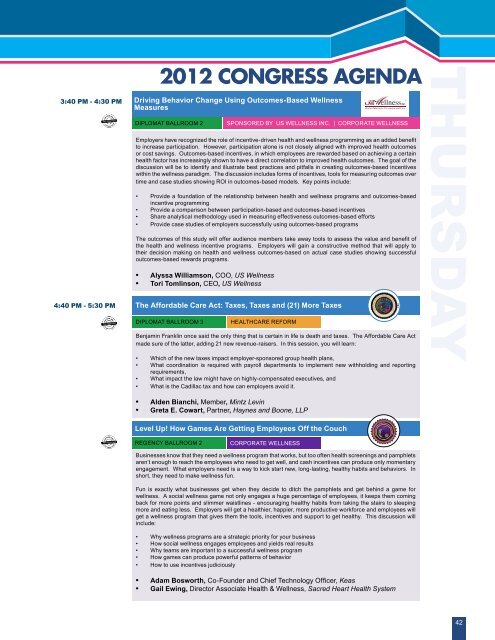2012 sPonsor Profiles - Employer Healthcare & Benefits Congress
2012 sPonsor Profiles - Employer Healthcare & Benefits Congress
2012 sPonsor Profiles - Employer Healthcare & Benefits Congress
You also want an ePaper? Increase the reach of your titles
YUMPU automatically turns print PDFs into web optimized ePapers that Google loves.
3:40 PM - 4:30 PM<br />
<strong>2012</strong> <strong>Congress</strong> agenDa<br />
Driving Behavior Change Using Outcomes-Based Wellness<br />
Measures<br />
Health Education, Prevention and Care<br />
DIPLOMAT BALLROOM 2 SPONSORED BY US WELLNESS INC. | CORPORATE WELLNESS<br />
<strong>Employer</strong>s have recognized the role of incentive-driven health and wellness programming as an added benefit<br />
to increase participation. However, participation alone is not closely aligned with improved health outcomes<br />
or cost savings. Outcomes-based incentives, in which employees are rewarded based on achieving a certain<br />
health factor has increasingly shown to have a direct correlation to improved health outcomes. The goal of the<br />
discussion will be to identify and illustrate best practices and pitfalls in creating outcomes-based incentives<br />
within the wellness paradigm. The discussion includes forms of incentives, tools for measuring outcomes over<br />
time and case studies showing ROI in outcomes-based models. Key points include:<br />
• Provide a foundation of the relationship between health and wellness programs and outcomes-based<br />
incentive programming<br />
• Provide a comparison between participation-based and outcomes-based incentives<br />
• Share analytical methodology used in measuring effectiveness outcomes-based efforts<br />
• Provide case studies of employers successfully using outcomes-based programs<br />
The outcomes of this study will offer audience members take away tools to assess the value and benefit of<br />
the health and wellness incentive programs. <strong>Employer</strong>s will gain a constructive method that will apply to<br />
their decision making on health and wellness outcomes-based on actual case studies showing successful<br />
outcomes-based rewards programs.<br />
• Alyssa Williamson, COO, US Wellness<br />
• Tori Tomlinson, CEO, US Wellness<br />
4:40 PM - 5:30 PM The Affordable Care Act: Taxes, Taxes and (21) More Taxes<br />
DIPLOMAT BALLROOM 3 HEALTHCARE REFORM<br />
Benjamin Franklin once said the only thing that is certain in life is death and taxes. The Affordable Care Act<br />
made sure of the latter, adding 21 new revenue-raisers. In this session, you will learn:<br />
• Which of the new taxes impact employer-sponsored group health plans,<br />
• What coordination is required with payroll departments to implement new withholding and reporting<br />
requirements,<br />
• What impact the law might have on highly-compensated executives, and<br />
• What is the Cadillac tax and how can employers avoid it.<br />
• Alden Bianchi, Member, Mintz levin<br />
• Greta E. Cowart, Partner, Haynes and Boone, llP<br />
Level Up! How Games Are Getting Employees Off the Couch<br />
REGENCY BALLROOM 2 CORPORATE WELLNESS<br />
Businesses know that they need a wellness program that works, but too often health screenings and pamphlets<br />
aren’t enough to reach the employees who need to get well, and cash incentives can produce only momentary<br />
engagement. What employers need is a way to kick start new, long-lasting, healthy habits and behaviors. In<br />
short, they need to make wellness fun.<br />
Fun is exactly what businesses get when they decide to ditch the pamphlets and get behind a game for<br />
wellness. A social wellness game not only engages a huge percentage of employees, it keeps them coming<br />
back for more points and slimmer waistlines - encouraging healthy habits from taking the stairs to sleeping<br />
more and eating less. <strong>Employer</strong>s will get a healthier, happier, more productive workforce and employees will<br />
get a wellness program that gives them the tools, incentives and support to get healthy. This discussion will<br />
include:<br />
• Why wellness programs are a strategic priority for your business<br />
• How social wellness engages employees and yields real results<br />
• Why teams are important to a successful wellness program<br />
• How games can produce powerful patterns of behavior<br />
• How to use incentives judiciously<br />
• Adam Bosworth, Co-Founder and Chief Technology Officer, Keas<br />
• Gail Ewing, Director Associate Health & Wellness, Sacred Heart Health System<br />
THuRsdAy<br />
AGENDA CONTINUES ON THE NEXT PAGE<br />
42


